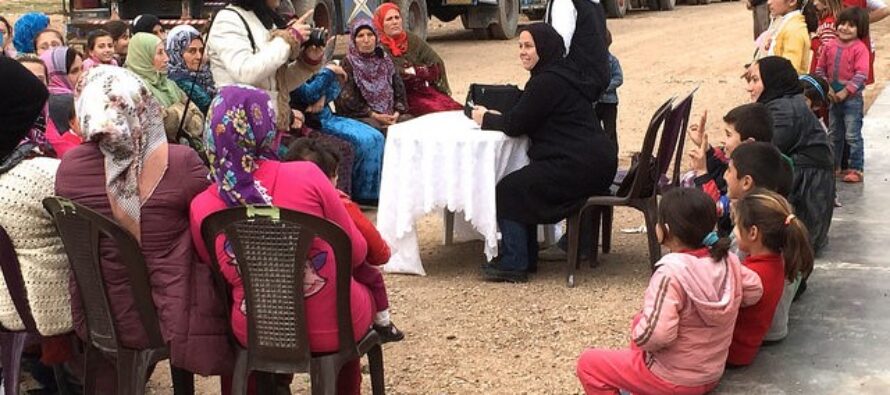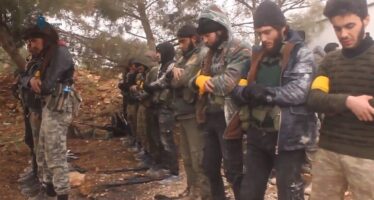Defend Rojava. An Open Letter

![]()
When Raqqa fell in 2017, after a long siege by the US-backed, Kurdish-led Syrian Democratic Forces (SDF), it was generally thought that ISIS was defeated save for some mopping up. But in January of this year, Turkey invaded Afrin—one of three cantons in Rojava, also called the Democratic Federation of Northern Syria. This meant that scores of SDF fighters had to leave the battle against ISIS in order to defend their homes, families, and neighbors in Afrin. After extensive air strikes, the city of Afrin fell on March 18—confronting the already troubled region with yet another humanitarian crisis, as thousands fled to escape the Turkish army and its Syrian National Army allies (which include jihadist rebel groups and some fighters who are either openly aligned with al-Qaeda or even recent members of ISIS).
Many of those who fled Afrin are now sleeping in open fields or tent cities, lacking the most elementary necessities. Those who remain have been subjected to the same kind of ethnic discrimination, looting, and sexual violence that ISIS perpetrated against the Yazidis in Iraq. At least fifteen girls have been abducted and their families fear that they are being held as sex slaves.
We are launching the Emergency Committee for Rojava as part of a global campaign to draw attention to this new crisis and to Afrin’s call for support.
The Turkish attack on Afrin was entirely unprovoked. In fact, Afrin was so peaceful for most of the Syrian war that it became a safe haven for tens of thousands of refugees—some of whom are now refugees for a second time. In the cantons they controlled, the Kurdish-led forces had established an oasis, unique in Syria, of local self-government, women’s rights, and secular rule. Yet the Turkish government cynically claims that it is threatened by Rojava because the people leading it—who have been the US’s leading allies in the fight against ISIS in Syria—are “terrorists.”
While the attack on Afrin is a violation of international law comparable to those of the Assad government, the Trump administration has made only feeble protests against President Recep Tayyip Erdoğan’s depredations. By accepting Turkey’s attack, the US has become complicit in Erdoğan’s ethnic cleansing plan to expel the Kurds once and for all from a part of Syria where they have lived for centuries, and to eradicate the democratic experiment developing in Rojava.
Encouraged by the lack of response from the US, Erdoğan is threatening to take his military campaign deeper into Syria, to Manbij, and even into Iraqi Kurdistan. It is clear that this campaign is already benefiting ISIS in multiple ways. To stop this madness, Turkey must be isolated economically, diplomatically, and militarily until it withdraws its troops and its proxy militias from Kurdish Syria. In the long run, there can be no peace in the region until Turkey is willing to reopen negotiations with its own Kurds and grant all its citizens democratic rights, including freedom of expression and the right to form political parties and win elections without reprisals.
The Emergency Committee for Rojava is calling on the US government to:
- Impose economic and political sanctions on Turkey’s leadership;
- Embargo sales and delivery of weapons from NATO countries to Turkey;
- Insist upon Rojava’s representation in Syrian peace negotiations;
- Continue military support for the SDF.
Please join us as signatories and supporters in our call for the US and its allies to end their tacit acquiescence in Turkey’s military adventure and restore peace and safety to the people of Rojava. And join us in spreading the word by going to our contact page and sending us your email address so we can contact you about future events and ways you can help.
Emergency Committee for Rojava
Debbie Bookchin, journalist, co-editor of The Next Revolution: Popular Assemblies and the Promise of Direct Democracy
Charlotte Bunch, Distinguished Professor of Women’s and Gender Studies, Rutgers University
Judith Butler, Maxine Elliot Professor of Comparative Literature, UC Berkeley
Noam Chomsky, Institute Professor and Professor of Linguistics Emeritus, MIT
Bill Fletcher, Jr., Writer, former director of Trans-Africa Forum
Todd Gitlin, Professor of Journalism and Sociology, Columbia University
David Graeber, Professor of Anthropology, London School of Economics
Michael Hardt, Professor of Literature, Duke University
David Harvey, Distinguished Professor of Anthropology and Geography, CUNY
Sally Haslanger, Ford Professor of Philosophy and Women’s and Gender Studies, MIT
Robert Hockett, Edward Cornell Professor of Law, Cornell University.
Chad Kautzer, Associate Professor of Philosophy, Lehigh University
Anna-Sara Malmgren, Assistant Professor of Philosophy, Stanford University
Edress Othman, physician, Director of Afrin Fund, board member of New England Kurdish Association
Marina Sitrin, Assistant Professor of Sociology, SUNY Binghamton
Gloria Steinem, Feminist writer, journalist, and activist, co-founder of Ms. Magazine
Asta Kristjana Sveinsdottir, Associate Professor of Philosophy, San Francisco State University
Latif Tas, Assistant Professor at the Maxwell School of Citizenship and Public Affairs, Syracuse University
Meredith Tax, Writer and activist, author of A Road Unforeseen: Women Fight the Islamic State
Michael Walzer, Professor Emeritus of Social Science, Institute for Advanced Study, Princeton
Janet Afary, Mellichamp Chair in Global Religion, UC Santa Barbara
Cathy Albisa, Executive Director NESRI (National Economic & Social Rights Initiative)
Kevin Anderson, Professor of Sociology, UC Santa Barbara
Heather Booth, Founding Director Midwest Academy, initiator of JANE, Democracy Partners
Ellen Chesler, Senior Fellow, Roosevelt House
Adam Gaffney, physician, Harvard Medical School
Andrej Grubacic, Chair of the Anthropology and Social Change Department, California Institute for Integral Studies
Anissa Helie, Associate Professor of History, John Jay College, CUNY
Marianne Hirsch, Director, Center for the Study of Social Difference, Columbia University
Amber Holllibaugh, Senior Activist Fellow Emeritus, Barnard Center for Research on Women (BCRW)
Shea Howell, steering committee, James and Grace Lee Boggs Center to Nurture Community Leadership
Ellen W. Kaplan, Professor of Theatre, Smith College
Temma Kaplan, Distinguished Professor of History, Emerita, Rutgers University
Marilyn Katz, Writer, activist and President of MK Communications
Michael Kazin, Professor of History, Georgetown University, Editor of “Dissent”
Frances Kissling, President, Center for Health, Ethics and Social Policy
Rebecca Kukla, Professor of Philosophy, Kennedy Institute of Ethics, Georgetown University
Mark Lance, Professor of Philosophy and Justice and Peace, Georgetown University
Steven Lukes, Professor of Sociology, New York University
Ruth Milkman, Distinguished Professor of Sociology, CUNY Graduate Center
Judy Norsigian, Co-founder and chair of the board, Our Bodies Ourselves
Rosalind Petchesky, Distinguished Professor Emerita of Political Science, Hunter College and the Graduate Center, CUNY
Katha Pollitt, poet, writer, and columnist for “The Nation”
Michele Pred, conceptual artist and activist
John Protevi, Phyllis M. Taylor Professor of French Studies, Louisiana State University
Geoff Pynn, Assocate Professor of Philosophy, Northern Illinois University
Jesse Ribot, Professor of Geography, University of Illinois
David Romano, Thomas G. Strong Professor of Middle East Politics, Missouri State University
Ellen Ross, Professor Emerita of History and Women’s Studies, Ramapo College
Michael Rothberg, 1939 Society Samuel Goetz Chair in Holocaust Studies, UCLA
Bruce Shapiro, Executive Director, Dart Center for Journalism and Trauma, Columbia University
Jason Stanley, Jacob Urowsky Professor of Philosophy, Yale University
Stephanie Urdang, Writer and activist
The Emergency Committee for Rojava
“The Emergency Committee for Rojava was initiated by four concerned observers who have been following the Rojava experiment in feminism, pluralism, democracy and environmentalism from its beginnings.
The open letter published…in The New York Review of Books (NYR Daily) on April 23, 2018, is primarily intended as an organizing tool. Our aim is to encourage and help facilitate coordinated action to end the occupation of Afrin and support autonomy for Rojava.
Please share your ideas of how to proceed. If you fill out the contact form on this website and email us your suggestions, we promise to get back to you.”
Image
Women’s assembly near Qamislo
Photo by Janet Biehl in Rojava
(CC BY-SA 2.0) https://creativecommons.org/licenses/by-sa/2.0/
Related Articles
Racist Attack On HDP Election Tour In Edirne
![]()
A racist group attacked an HDP election bus in the district of Ke?an in Edirne Province on Wednesday. The HDP
AFRIN: NEW ISIS CAPITAL ON THE WAY – VIA TURKEY?
![]()
Since Turkey gained control of the Afrin Region of Rojava following its entry to Afrin City on March 18 after 58 days resistance by the Kurdish YPG and its allies, concern has continued to grow about the fate of the region
First academic research on PKK’s demographics
![]()
A recent academic study has analyzed files on 461 PKK members in the Kandil Mountains of northern Iraq. According to



